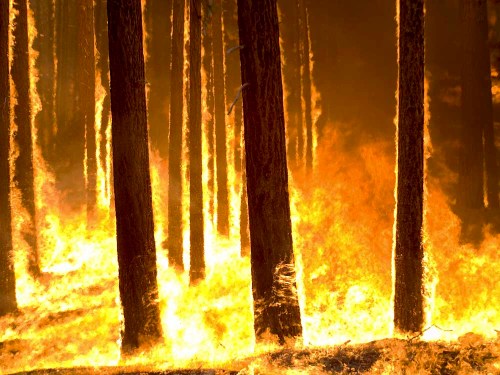Wildfire season begins amid heat, drought in SW Oregon
Published 6:00 pm Monday, May 4, 2020

- After some last-minute jockeying and wordsmithing, both backers and advocacy groups who had opposed elements of Oregon’s omnibus wildfire response bill say they are satisfied with the version that lawmakers passed last month.
MEDFORD — Wildfire season is beginning a month ahead of schedule in Southwest Oregon as drought conditions intensify across the region.
The state Department of Forestry declared the beginning of fire season May 1 in the Southwest Oregon District, which includes 1.8 million acres of state-protected lands in Jackson and Josephine counties.
It is the earliest start to a fire season in the district since April 18, 1988, and only the third time since 2000 that fire season was called before June 1. Brian Ballou, spokesman for ODF in Medford, said firefighters responded to 25 fires in April — about five times more than usual for the month.
“We’re used to chasing escaped burns and (slash) fires usually in the latter half of May. That’s just normal,” Ballou said. “Then we’ll start fire season sometime in early June. But this year, we’re just a month off, if not a little more than a month.”
One fire in particular raised red flags for the district. On April 21, a landowner was burning brush about 4 miles north of the city of Rogue River when gusty winds fanned the flames out of control, spreading quickly over 20 acres. Most years, fires only burn a few acres in April, Ballou said.
“He was clearly flummoxed that his fire so quickly blew out of control,” he said. “It blew up through a steep canyon all the way to the top of the ridge. It was an impressive show for about an hour.”
According to the U.S. Drought Monitor, 96% of Oregon is in some stage of drought, though the driest conditions are in the southwest corner of the state where “extreme” drought is creeping into Jackson, Josephine and Curry counties.
As of May 1, the Rogue and Umpqua basins have received just 66% of normal precipitation for the water year dating back to Oct. 1, 2019, figures from the USDA Natural Resources Conservation Service show. Ballou said flows in the Rogue, Applegate and Illinois rivers are all low, and streams are expected to dry up early.
“We’re way behind in rainfall and water in general,” he said. “Depending on where you draw your measurements from, we’re 5-8 inches behind in the water year.”
The National Interagency Fire Center in Boise is predicting more hot and dry weather for the Northwest to come this summer. In the center’s latest seasonal forecast for May through August, experts are predicting greater potential for large wildfires beginning in Southwest Oregon before spreading across the Pacific Northwest.
“While the Pacific Northwest received beneficial precipitation in late April, the overall pattern has been warm and dry, which may be problematic for Oregon and Central through Eastern Washington,” forecasters stated.
The Northwest Interagency Coordination Center in Portland has tallied 80 fires so far in Oregon that have burned 2,129 acres — as reported by state, federal and tribal firefighting agencies.
At this time last year, Oregon had 31 fires burning 631 acres. In 2018, the total was 42 fires and 1,528 acres.
With the start of fire season in southwest Oregon, all backyard burning and burning in incinerators is now prohibited. No burn permits will be issued. As for industrial loggers, the fire precaution is set at level 1, meaning they must keep a one-hour fire watch, fire tools and water truck with at least 300 gallons on site.
Campfires are still allowed in designated camp sites and private land with the landowner’s permission. Fireworks, tracer ammunition, exploding targets and smoking around dry vegetation are all prohibited.
Ballou said he expects the district to have five fully staffed fire engines stationed in both Medford and Grants Pass within the next week to 10 days.
“Certainly, taking fire prevention very seriously this year will help us out a great deal,” he said, adding this season could be one of the worst in recent memory.









